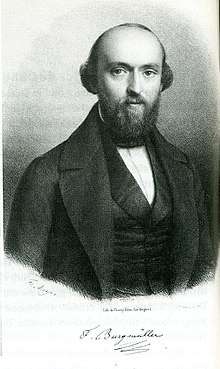Johann Friedrich Franz Burgmüller
Johann Friedrich Franz Burgmüller, generally known as Friedrich Burgmüller (born Regensburg, Germany 4 December 1806 – 13 February 1874) was a German pianist and composer. [1] perhaps best known for three collections of children's etudes (or "teaching pieces") for the piano, particularly his Op. 100 "25 Études faciles et progressives" (25 Easy and Progressive Studies) for early intermediate students; the other two collections, for more advanced students, were Op. 105 and 109
Friedrich Burgmuller | |
|---|---|
 Johann Friedrich Franz Burgmüller from a lithograph, c.1840 | |
| Born | Johann Friedrich Franz Burgmüller December 4, 1806 |
| Died | February 13, 1874 |
| Occupation |
|
| Parent(s) |
|
| Relatives | Norbert Burgmuller (younger brother) |
Life
Friedrich was born in Ratisbon (now Regensburg) Germany, on December 4, 1806.[1] His father, Friedrich August Burgmüller, and his younger brother, Norbert Burgmüller, were also composers. His mother was pianist and singer Therese von Zandt.
He moved to Kassel in 1829 to study under Ludwig Spohr and Moritz Hauptmann.[1] There he appeared as a pianist for his first concert, January 14, 1830.[1]
Friedrich moved to Paris in 1832 (at age 26),[1] where he stayed until his death. Norbert, his brother, made plans to join him in Paris, in 1835. However, he drowned in a spa in Aachen a year later. In Paris, Friedrich adopted Parisian music and developed his trademark (light) style of playing. He wrote many pieces of salon music for the piano and published several albums. Burgmüller also went on to compose piano études intended for children. He died in Paris on February 13, 1874.
| Wikimedia Commons has media related to Friedrich Burgmüller. |
Works
Burgmüller composed piano pieces, waltzes, nocturnes, polonaises and two ballets. His piece, the Peasant Pas de Deux was added to Adolphe Adam's ballet Giselle for its 1841 premiere. This music was originally titled Souvenirs de Ratisbonne.
Ballets
- La Péri
- Lady Harriet
The musical works of Friedrich Burgmüller are listed below. The list is divided into works given an Opus number by the composer and those that were not.
With opus number
- 6 Mélodies gracieuses de Bellini, Op.26
- Souvenir de Bellini, Op.27
- Souvenir de Schönbrunn, Op.32
- La Cachucha, Op.36
- Murmures du Rhone, Op.66 (Whispering or Murmuring Rhône)
- Corbeille de roses, Op.68 (Basket of Roses)
- Fleurs Mélodiques, Op.82 (Flower Melodies)
- Fantaisie Brillante sur 'Ernani' de Verdi, Op.92 (Brilliant or Excellent Fantasy based on Verdi's 'Ernani')
- Blaue Äuglein, Op.93 (Little Blue Eyes)
- Les Étincelles, Op.97 (Sparks)
- 25 Études faciles et progressives, Op.100 (25 studies for piano)
- La Candeur
- La Chevaleresque (The Chivalrous)
- L'Arabesque
- Ballade
- 12 Études, Op.105
- 18 Études, Op.109 (18 Characteristic studies)
- Les perles (The Pearls)
- L'Orage (The Storm)
Without opus number
- L'ange consolateur
- Ay Chiquita
- 3 Nocturnes for Cello and Guitar
- Le Pardon de Ploërmel
- La Péri
- Souvenirs de Londres
References
External links
- Free scores by Burgmüller at the International Music Score Library Project (IMSLP)
- Werke von und über Johann Friedrich Franz Burgmüller in the German National Library catalogue
- Free scores Mutopia Project
- Link to Recording of the Opus 100 Etudes at the Piano Society Website
- Description of the Opus 100 Etudes by Noriaki Nomoto
- "Etudes op. 100 von Friedrich Burgmüller, pianoforte Pleyel". YouTube. 7 December 2012. Retrieved 2 June 2013.